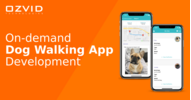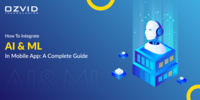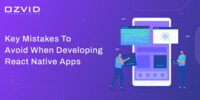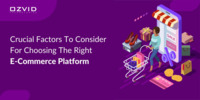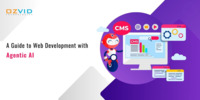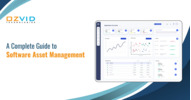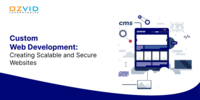- Mar 12, 2024
- Web Development
- 10250
Share this post on:
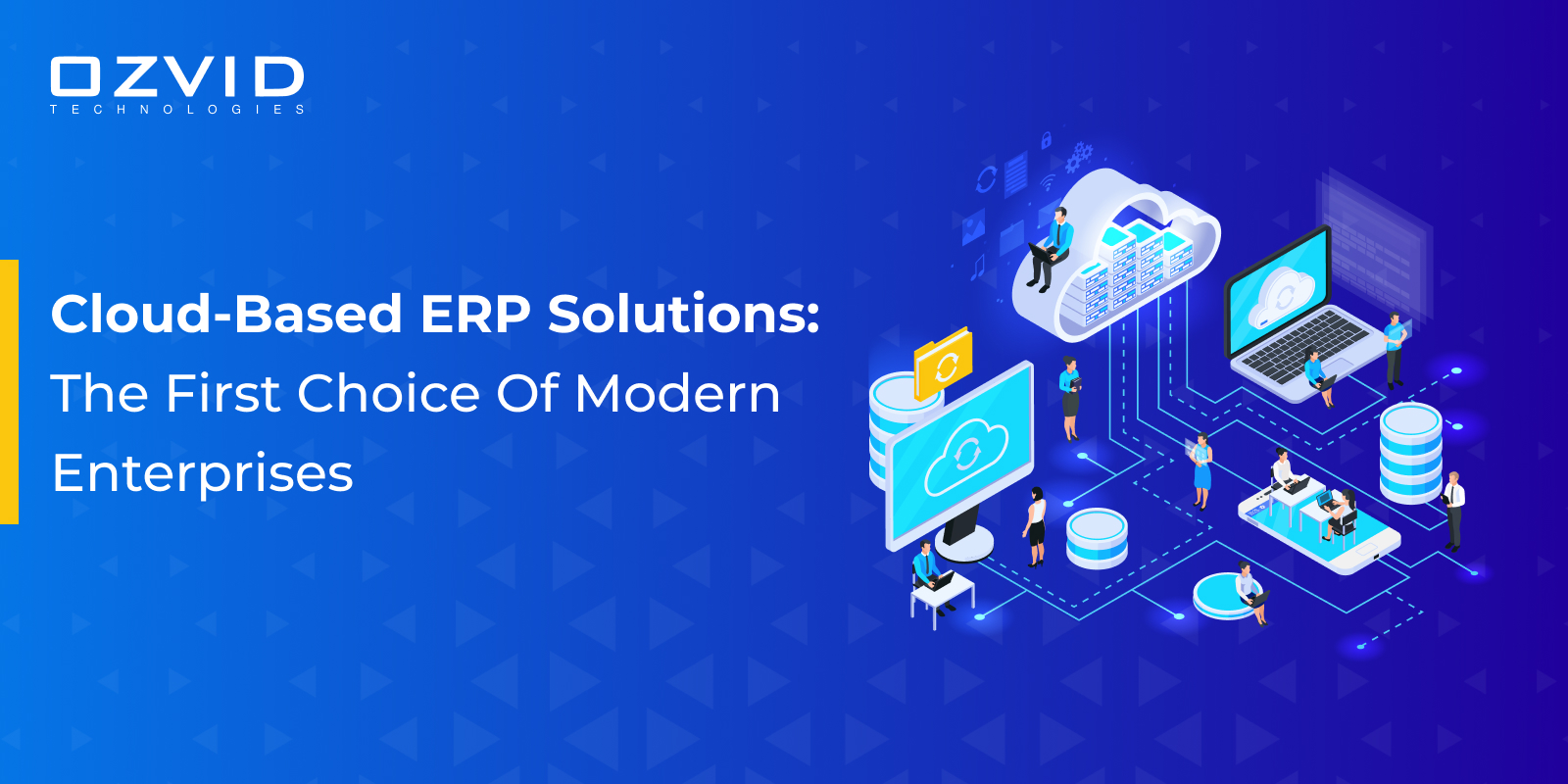
Garter reported that by 2023, 65% of organizations will use ERP solutions in their businesses. We live in an era where organizations must adapt to the constant changes happening in technology.
With time, the demand for optimized operation management has increased. So, businesses need to invest in mobile ERP systems. These systems help organizations streamline their processes and enhance productivity.
Moreover, ERP solutions help organizations get access to real-time data and analytics, thereby making all the difference in staying ahead of the competition. It is where mobile enterprise resource planning (ERP) solutions come into play. With the ability to access critical information from anywhere at any time, mobile ERP solutions have become increasingly important for modern businesses.
Significance of Cloud-based ERP Solutions
Mobile ERP systems allow employees to perform their duties properly and give the flexibility to access and manage critical data on the go. This system helps employees to work more efficiently and effectively, leading to improved productivity and better decision-making throughout the organization.
One of the main advantages of using mobile ERP solutions is the ability to gain real-time insights into your business operations. Managers can quickly identify trends, issues, or opportunities by accessing up-to-date financial reports, inventory levels, customer orders, and other metrics from their smartphones.
Since teams can access the same real-time data through their mobile devices, communication becomes effective. Employees can share documents, discuss projects, assign tasks, and track progress.
Mobile ERP Software: Types that Benefits Custom Businesses
Enterprise resource planning (ERP) software has transformed how modern businesses operate. Developing custom mobile ERP software that aligns with business requirements is crucial for any business. They help businesses integrate numerous functions such as finance, human resources, supply chain management, and others into one system.
With the help of smartphones and tablets, mobile devices have emerged as essential tools for many professionals. Let us see the different types of mobile ERP solutions designed to cater to the specific needs of businesses.
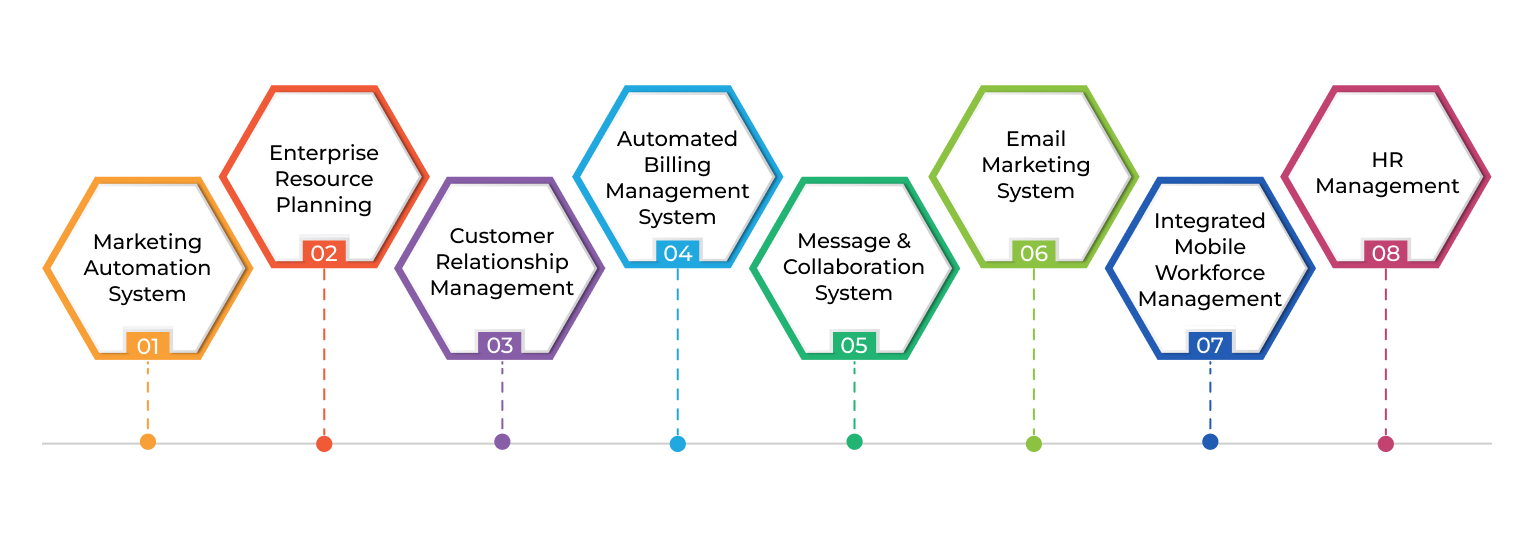
- Marketing Automation System: Marketing automation systems are cloud-based mobile ERP solutions that automate repetitive marketing tasks. These tasks include social media posting, email campaigns, and lead generation. Additionally, these systems often integrate with other technologies and offer a seamless experience.
For example, leads generated through marketing efforts can automatically sync with CRM platforms. This system helps the sales team follow up immediately. Marketing automation systems help organizations save time and resources while improving customer engagement.
- Enterprise Resource Planning: Enterprise resource planning (ERP) systems are comprehensive cloud-based mobile ERP solutions that manage multiple aspects of an organization. It includes financials, inventory, orders, human resources, and more.
ERP systems handle workflows from different functional areas within a company on one centralized platform. These systems facilitate informed decision-making, increase efficiency, reduce errors, optimize resource allocation, and improve collaboration among departments.
- Customer Relationship Management: Customer relationship management (CRM) systems are part of cloud-based mobile ERP solutions. They focus on managing interactions and relationships with clients, vendors, partners, suppliers, and stakeholders. The main objective of these systems is to acquire, retain, and grow a client base by offering personalized services.
Some features of CRM modules include contact directories, appointment scheduling, task assignments, pipeline tracking, lead scoring, reporting, and analytics dashboards. Effective implementation of CRM strategies allows companies to develop a deep understanding of their audiences and respond quickly to changing conditions in highly dynamic digital environments.
- Automated Billing Management System: An automated billing system is a cloud-based mobile ERP solution. It simplifies the process of generating accurate invoices and collecting payments from clients. These systems handle complex calculations, billing cycles, payment terms, and currency conversions.
Automated billing systems integrate well with existing accounting packages and maintain full transparency throughout every step of the transaction lifecycle.
- Message and Collaboration System: A message and collaboration system is a cloud-based mobile ERP solution focused on facilitating information exchange between employees, stakeholders, and external contacts. It includes tools for messaging, file sharing, video conferencing, and screen recording and enables asynchronous and synchronous interaction, document creation, editing, commenting, signing, approvals, and notifications.
Users can access these applications from anywhere using desktop computers, laptops, smartphones, tablets, and wearable tech.
- Email Marketing System: Email marketing systems are cloud-based mobile ERP solutions designed to help businesses send targeted and personalized messages to large groups of people. These platforms enable the marketing team to create engaging content, monitor campaign performance metrics, and predict consumer behavior.
- Integrated Mobile Workforce Management: An integrated mobile workforce management solution streamlines the coordination and organization of field workers' activities. GPS navigation, dispatch, resource optimization, schedule optimization, and vehicle. This software also provides remote IT support services during incidents or maintenance windows, ensuring minimal disruption to operations while maintaining robust security measures.
- HR Management: Human Resource (HR) Management cloud-based mobile ERP solutions manage core aspects associated with employee lifecycle management, including hiring, training and development, payroll, leave tracking, time attendance, talent acquisition, and other HR-related functions.
Key features often incorporate applicant tracking, candidate sourcing, resume parsing, background checks, interview scheduling, performance reviews, and goal setting. Cloud computing further empowers HR departments by reducing the complexities associated with managing administrative tasks and providing secure access to sensitive employee information anytime and anywhere.
Mobile ERP Software: Robust Features
Mobile ERP solutions are helping businesses streamline their operations and improve efficiency.
Mobile ERP applications provide access to critical data and processes from anywhere at any time. It helps employees make better decisions and work more efficiently.

Real-time Access: A robust mobile enterprise resource planning (ERP) solution delivers seamless real-time data access for main functions across an extended supply chain. This enables users to make informed decisions quickly to achieve optimal outcomes. Having access to key data points simplifies operations management, inventory control, order fulfillment, demand forecasting, project monitoring, resource planning, and cash flow optimization.
Real-time data helps businesses deal with scenarios where customer requirements change over time. Having access to up-to-date and accurate data makes it possible for businesses to respond quickly.
A mobile ERP architecture should be optimized for scalability and reliability to ensure smooth accessibility and prevent issues
Workflow management: Workflow management is a crucial component of a robust mobile Enterprise Resource Planning (ERP) solution that helps optimize business workflows through automated procedures, streamlining communication between various stakeholders involved. Here are a few workflow management features found in many ERP systems:
- Process Modeling: Enables users to create graphically interactive process models and diagrams by using predefined templates or customized approaches. These diagrams allow for an easier understanding of business workflows.
- User-Defined Forms: Facilitates creating configurable forms to collect relevant data from users, enhancing data quality and accuracy throughout the workflow execution cycle. Users may define their own form fields and validation rules according to specific business requirements.
Inventory and supply chain management: An effective inventory and supply chain management system plays a vital role in a company. Thus, a robust mobile ERP (Enterprise Resource Planning) solution must integrate inventory and supply chain management modules. These modules provide real-time insights into stock levels, transportation logistics, supplier performance, and more. Some crucial inventory and supply chain management features in a mobile ERP solution are:
- Real-Time Visibility: One of the most significant benefits of an ERP system with robust inventory management functionality is its ability to give companies real-time visibility into stock levels, sales orders, purchases, shipments, and returns. This information helps managers and executives understand how the business is performing and where improvements are required.
- Advanced Forecasting Techniques: Another valuable characteristic of a top-tier mobile ERP inventory module is the ability to use forecasting algorithms and techniques. Companies can use predictive analytics tools to generate demand forecasts, which will enable them to make plans.
Sales and customer management: A mobile Enterprise Resource Planning (ERP) solution must provide efficient and reliable sales and customer management features. Good sales processes drive revenue growth. Having a comprehensive set of tools help businesses manage leads, deals, transactions, payments, etc. Let's explore some key aspects of sales and customer management functions in a mobile ERP:
- Customizable Dashboards and Reporting: Provides flexibility for sales teams, managers, and administrators to configure customized dashboards. Real-time reporting tools allow businesses to analyze sales pipelines and assess team performances, which leads to informed decision-making and better target setting.
- CRM Integration: Effective collaboration with sales and customer service requires tight integration with Customer Relationship Management (CRM) systems. It ensures seamless synchronization between the two platforms using industry standards such as SOAP or REST APIs, Webhooks, etc.
- Account Management: It offers extensive features to maintain accurate records of both contacts and accounts. These elements include advanced search capabilities and personalized communications based on custom attributes, tags, or segments.
Reporting and analytics: Accurate data analysis and actionable insights form the backbone of strategic decisions within any enterprise. A robust mobile ERP solution should provide extensive reporting and analytics capabilities that allow users to make well-informed choices and optimize resource allocation effectively. Here are crucial reporting and analytics features to look out for in a high-quality mobile ERP system:
- Interactive Dashboarding: The visual representation of meaningful data through charts, graphs, maps, or tables enables fast and intuitive decision-making at all organizational levels. Ensure that your mobile ERP provides interactive, self-service BI interfaces accessible across various devices.
- Predictive Modeling and Scenario Analysis: Harness the world of machine learning and statistical methods to develop forward-looking models and run simulations. These functionalities empower users to perform analysis and make calculated predictions for smart decision-making.
- Key Performance Indicator (KPI) Monitoring and Alerting: Defining, displaying, and tracking multiple KPIs throughout the organization ensures everyone remains focused on meeting desired objectives.
Security and access control: Data security is an essential aspect of any ERP implementation, especially when it comes to mobile applications accessed remotely over public networks. Let us discuss important security and access control features that must be present in a robust mobile ERP solution.
- User Authentication and Authorization: The application should enforce strong login credentials using Multi-Factor Authentication (e.g., biometric scans, OTP tokens, or certificates).
- Network and Communication Encryption: Secure communication channels involving HTTPS connections, TLS or SSL encryption, digital signatures, or secure message formats to ensure the confidentiality of transmitted data. It protects against eavesdropping attacks or accidental exposure of data during transmission over unsecured wireless networks.
- Session Timeout and Activity Monitoring: Automatically terminate active sessions after prolonged periods of inactivity or when suspicious activities are detected. Use behavioral monitoring algorithms capable of recognizing unusual patterns or unexpected usage habits.
Conclusion:
In summary, mobile ERP solutions offer numerous benefits and features to organizations that help businesses streamline their operations, optimize employee efficiency, enhance collaboration, and improve the overall customer experience. These tools help business leaders make informed decisions based on accurate and current data. Overall, investing in mobile ERP solutions is a wise choice for any organization seeking growth and success in the long run.


